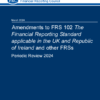
by John McCarthy Consulting Ltd. | Feb 18, 2024 | Blog, News
It’s extremely important that practitioners give the Anti-Money Laundering (AML) legislation the attention it deserves and ensure full compliance with the responsibilities placed upon them by the law.
A case that dates back to December 2016, illustrates the importance of remaining alert for the red flags that can indicate money laundering (ML) is taking place. An ICAEW member, based in Leeds, was fined £5,000 by Leeds Magistrates Court and also the ICAEW severely reprimanded him, ordering that he pay costs of over £3,000 and seek training in the operation of the AML legislation.
The AML offence related to the fact that the client ‘Ms A’, was advised by HMRC that they were enquiring into their Corporation Tax Return. Ms A in turn advised the accountant that she and her husband were moving to another accountant who was presumably more experienced in tax enquiry work. She also pointed out that the issue related to an over-claim on mileage expenses and filing false tax returns.
This very fact was enough to warrant that the accountant ought to have known that the client had falsified their claims and tax was understated, irrespective of the amount of tax involved and that a ML offence had occurred. Yet the accountant did not make the necessary notifications to the authorities. Unknown to the accountant, the client’s company was involved in a much more serious fraud on the NHS by supplying false invoices for training services provided by her husband, who worked within the NHS.
The Judge indicated his view that the defendant ought to have been aware of his professional obligations concerning disclosures of this type. The belief that those disclosures would be taken up by the newly instructed tax specialists for Ms ‘A’ was not a meaningful excuse.
Money Laundering legislation needs respected and reports must be made where the circumstances necessitate it, irrespective of the amounts involved, as materiality is zero. This accountant has paid dearly for failure to do so and it is a salutary lesson for us all.
To hear more about the latest AML developments and how to be on the alert for suspicions of money laundering and terrorist financing under the Criminal Justice (Money Laundering and Terrorist Financing) Acts 2010 to 2021, see our latest Anti-Money Laundering webinar here.
All our courses are listed here.
Please also go to our website to see our:
- Anti-Money Laundering Policies Controls & Procedures Manual (March 2022) – View the Table of Contents click here.
- AML Webinar (December 2023) available here, which accompanies the AML Manual. It explains the latest legal AML reporting position for accountancy firms and includes a quiz. Upon completion, you receive a CPD Certificate of attendance in your inbox.
- letters of engagement and similar templates. Please visit our site here where immediate downloads are available in Word format. A bulk discount is available for orders of five or more items if bought together.
- ISQM TOOLKIT or if you prefer to chat through the different audit risks and potential appropriate responses presented by this new standard, please contact John McCarthy FCA by e-mail at john@jmcc.ie.
- We typically tailor ISQM training and brainstorming sessions to suit your firm’s unique requirements. The ISQM TOOLKIT 2022 is available to purchase here.

by John McCarthy Consulting Ltd. | Feb 14, 2024 | Blog, News
The Protected Disclosures (Amendment) Act 2022 (the Act) requires certain entities to have in place procedures to establish internal reporting channels and procedures to enable workers make protected disclosures (defined as a ‘relevant wrongdoing’).
From 17 December 2023 its scope will be expanded to employers with over 50 employees.
The Act already applies to entities employing over 250 employees from 1 January 2023 including certain financial services entities (regardless of employee numbers) like AIFMs, MiFID firms, Irish UCITS management companies and other Irish financial service providers, as well as Irish domiciled corporate funds.
The 2022 Act expands the scope of the Protected Disclosures Act, 2014 to include areas such as:
- public procurement;
- financial services;
- anti-money laundering (AML);
- product safety and compliance;
- transport safety;
- environmental protection;
- radiation and nuclear safety;
- food and animal health and welfare;
- public health;
- consumer protection; and
- the protection of privacy and personal data.
Its scope has been further widened from 17 December 2023 when employers with over 50 employees will need to have such a policy in place. The basic steps for employers are:
- the establishment, maintenance and operation of a secure and confidential internal reporting channel for workers who wish to make a protected disclosure, whether in writing, orally or both;
- the designation of an impartial and competent person who may be internal/external; and
- an obligation to provide workers with information on the internal/external protected disclosure reporting process.
The Act also creates a newly established Office of the Protected Disclosures Commissioner (www.opdc.ie) which will forward reports of work-related wrongdoing to the most appropriate body for initial assessment and follow-up.
Employees are given protection from dismissal from employment (among other protections) when they report a ‘relevant wrongdoing’ (defined which are defined to include:
- Where an offence has been or is likely to be committed;
- Non-compliance with a legal obligation – the 2014 Act excludes obligations arising under the worker’s contract of employment;
- A miscarriage of justice;
- Danger to the health and safety of any individual;
- Damage to the environment;
- An unlawful or otherwise improper use of funds or resources of a public body;
- Oppression, gross neglect or gross mismanagement by a public body; and
- Other breaches related to the financial interests of the EU the internal market, EU competition and state aid rules and internal market rules on corporate tax.
The legislation is complex and we cannot cover all its aspects in the space of a blog. We urge our readers to seek independent professional and legal advice where necessary.
IT Controls Assessment
Auditors are reminded that there are relatively significant changes in the requirements of ISA 315 Identifying and Assessing the Risks of Material Misstatement for accounting periods commencing 15 December 2021, which in practical terms means, accounting periods Ended 21 December 2022 and later.
Auditors dealing with the audits of entities with such accounting periods affected by these change will need, to adopt new audit programmes and, in additional to the normal audit tests, to also assess the entity’s IT controls (no matter what the size of that entity).
This is a significant new development for auditors of SMEs, in particular, and will be a game changer ion the type of audit documentation and evidence of assessment of such IT controls by the auditor on audit files.
For an easy to implement additional (two page) IT Controls Questionnaire to help document the above process, please click on this link to download immediately for only €60 + VAT.
Please also go to our website www.jmcc.ie/training to see our latest:
- Latest updated AML for Accountants webinar (December 2023) which explains the current legal AML reporting position for accountancy firms and includes a quiz. Upon completion, you receive a CPD Certificate of attendance in your inbox. A 20% discount is available for orders of five or more webinars/products, if bought together.
- There are other accounting/audit webinars on the site and more will follow throughout 2024.
- Anti-Money Laundering Policies Controls & Procedures Manual (March 2022) – View the Table of Contents click here.
- letters of engagement and similar templates. Please visit our site here where immediate downloads are available in Word format. A bulk discount is available for orders of five or more items if bought together.
- ISQM TOOLKIT – We can also tailor ISQM training and brainstorming sessions to suit your firm’s unique requirements. The ISQM TOOLKIT 2022 is available to purchase here.

by John McCarthy Consulting Ltd. | Dec 11, 2023 | Blog, News
In last week’s blog we looked at the overall responsibilities of the Money Laundering Reporting Officer
This week we look at the administrative aspects of the MLRO’s role.
STRs received
It is very important to keep a comprehensive record of all Suspicious Transaction Reports (STRs) received by the MLRO, including:
- the reasons, in writing, for decisions made as to whether the STR is sent to the Garda/Revenue or not.
- It is also strongly recommended that all verbal discussions and external professional and legal advice obtained regarding suspicions, are fully recorded.
Internal Quality Control
The guidance from the CCABI places considerable responsibility on the MLRO implementing and maintaining internal controls and risk management around Money Laundering and Terrorist Financing.
- As part of AML compliance, firms must carry out independent AML Compliance Reviews to assess the adequacy of their AML systems and controls;
- External reviews are not always necessary but hiring an external expert who carries out these reviews all the time will result in a more focused manner and will result in a much better compliance outcome for the firm. If the firm has the capacity, a partner or senior manager not involved with AML policies, controls and procedures could carry out the review, with sample checks each year;
- The MLRO should report formally to other partners and directors in writing every year on the effectiveness of the firm’s AML systems and controls.
Contents of the MLRO’s Annual Report
The MLRO’s report should include the following:
- Executive summary for the year highlighting any serious compliance deficiencies, together with details of the remedial action that has been taken;
- Review the number and quality of internal STRs and consider more focused training where none have been received;
- Number of external STRs submitted to the Garda/Revenue;
- Number of new clients declined because of unsatisfactory information;
- Details of staff training during the year –
- number of AML courses;
- details of new/existing staff attending;
- issues/queries/misunderstandings clarified;
- supporting evidence of AML training and proof of understandingg. documented quiz assessment results with supporting attendance certificates;
- Ensure that evidence is retained of the sample check of Client Due Diligence (CDD) files that were examined as part of the AML Compliance Review to ensure all information is relevant and up-to-date (e.g. identification is still valid, records match that of CRO and RBO websites, all ultimate beneficial owners (UBOs) and directors have been satisfactorily identified etc.);
- Sample check of clients’ AML risk assessments to ensure that existing risk ratings are still appropriate, relevant and up-to-date;
- Check that the AML Policies, Controls & Procedures Manual is up-to date;
- Check that the Firm-Wide Risk Assessment is current and up-to-date;
- Check that employees understand the role of ML and their individual responsibilities; and
- Ensure that recommendations from past internal/external inspections are fully implemented.
Please also go to our website to see our:
- Anti-Money Laundering Policies Controls & Procedures Manual (March 2022) – View the Table of Contents click here.
- AML webinar (March 2022) available here, which accompanies the AML Manual. It explains the current legal AML reporting position for accountancy firms and includes a quiz. Upon completion, you receive a CPD Certificate of attendance in your inbox.
- letters of engagement and similar templates. Please visit our site here where immediate downloads are available in Word format. A bulk discount is available for orders of five or more items if bought together.
- ISQM TOOLKIT or if you prefer to chat through the different audit risks and potential appropriate responses presented by this new standard, please contact John McCarthy FCA by e-mail at john@jmcc.ie.
We typically tailor ISQM training and brainstorming sessions to suit your firm’s unique requirements. The ISQM TOOLKIT 2022 is available to purchase here.

by John McCarthy Consulting Ltd. | Dec 2, 2023 | Blog, News
The term ‘MLRO’ is not mentioned in the legislation but at this stage has become well-established in practice. In this short series of blogs, we explore the role and responsibilities of the MLRO in an accountancy firm.
The MLRO is responsible for the following anti- money laundering (ML) tasks is an accounting firm:
- Implementing and enforcing an appropriate risk-based approach;
- Ensuring that the systems and controls in place are appropriate to manage the risks faced by the firm; and
- Ensuring that the firm complies with the legislation and CCABI Guidance.
The MLRO must also:
- Possess the knowledge, skills and understanding of the firm’s ML risks;
- Complete, and periodically update, the Firm-Wide Risk Assessment (also known as the Business Wide Risk Assessment) under section 30A of the Criminal Justice (Money Laundering and Terrorist Financing) Acts 2010 to 2021 which outlines and provides an assessment of these risks;
- Receive internal STRs (Suspicious Transaction Reports) from employees and Senior Management in the firm;
- Make the ultimate decisions on behalf of the firm on whether these suspicions need to be reported externally to the Garda And Revenue;
- Report to Garda And Revenue by completing and submitting an external STR on the GoAML system and subsequently with Revenue on ROS.
IT Controls Assessment
Auditors are reminded that there are relatively significant changes in the requirements of ISA 315 Identifying and Assessing the Risks of Material Misstatement for accounting periods commencing 15 December 2021, which in practical terms means, accounting periods Ended 21 December 2022 and later.
Auditors dealing with the audits of entities with such accounting periods affected by these change will need, to adopt new audit programmes and, in additional to the normal audit tests, to also assess the entity’s IT controls (no matter what the size of that entity).
This is a significant new development for auditors of SMEs, in particular, and will be a game changer ion the type of audit documentation and evidence of assessment of such IT controls by the auditor on audit files.
For an easy to implement additional (two page) IT Controls Questionnaire to help document the above process, please click on this link to download immediately for only €60 + VAT.
Please also go to our website to see our:
- Anti-Money Laundering Policies Controls & Procedures Manual (March 2022) – View the Table of Contents click here.
- AML webinar (March 2022) available here, which accompanies the AML Manual. It explains the current legal AML reporting position for accountancy firms and includes a quiz. Upon completion, you receive a CPD Certificate of attendance in your inbox.
- letters of engagement and similar templates. Please visit our site here where immediate downloads are available in Word format. A bulk discount is available for orders of five or more items if bought together.
- ISQM TOOLKIT or if you prefer to chat through the different audit risks and potential appropriate responses presented by this new standard, please contact John McCarthy FCA by e-mail at john@jmcc.ie.
We typically tailor ISQM training and brainstorming sessions to suit your firm’s unique requirements. The ISQM TOOLKIT 2022 is available to purchase here.

by John McCarthy Consulting Ltd. | Nov 28, 2023 | Blog, News
A controversial proposal to update the UK FRC Revised Ethical Standard from the Financial Reporting Council in the UK states that they are proposing to enhance the prohibition (among other proposals) on certain tax services that can be provided to the majority shareholders of unlisted entities. The proposal is for this service to be banned in the UK from 15 December 2024. Please note that this is a UK proposal only and is not necessarily going to be adopted as currently worded. It does not apply to audits for Republic for Ireland entity audits.
The proposal wording is as follows (quoting from the consultation document):
Tax Services
5.67 The range of activities encompassed by the term ‘tax services’ is wide. They include where the firm:
(a) provides advice to the entity on one or more specific matters at the request of the entity; or
(b) undertakes a substantial proportion of the tax planning or compliance work for the entity; or
(c) promotes tax structures or products to the entity, the effectiveness of which is likely to be influenced by the manner in which they are accounted for in the financial statements, or in audit subject matter information;
(d) performs any of the services described in paragraphs a-c to individuals who are the majority owner(s) of an unlisted entity relevant to an engagement.
This latter service is proposed to be banned from 15/12/2024 in the UK.’ The consultation is now closed as the deadline was 31 October 2023.
The reason we bring this to the attention of our readers in Ireland is that quite often the Irish Audit & Accounting Supervisory Authority (the audit regulator in Ireland) has, in the past, incorporated similar changes to the Code of Ethics for Auditors in Ireland, sometimes with amendments, but not always.
The normal process would be for the Irish Audit & Accounting Supervisory Authority to consult in Ireland on any changes to its Code of Ethics and, taking account of feedback received, may then publish a new Ethical Standard for auditors, which would most likely not be effective before 15 December 2024. At the time of writing we have no notice of such intent on the part of the Irish Audit & Accounting Supervisory Authority.
IT Controls Assessment
Auditors are reminded that there are relatively significant changes in the requirements of ISA 315 Identifying and Assessing the Risks of Material Misstatement for accounting periods commencing 15 December 2021, which in practical terms means, accounting periods Ended 21 December 2022 and later.
Auditors dealing with the audits of entities with such accounting periods affected by these change will need, to adopt new audit programmes and, in additional to the normal audit tests, to also assess the entity’s IT controls (no matter what the size of that entity).
This is a significant new development for auditors of SMEs, in particular, and will be a game changer ion the type of audit documentation and evidence of assessment of such IT controls by the auditor on audit files.
For an easy to implement additional (two page) IT Controls Questionnaire to help document the above process, please click on this link to download immediately for only €60 + VAT.
Please also go to our website to see our:
- Anti-Money Laundering Policies Controls & Procedures Manual (March 2022) – View the Table of Contents click here.
- AML webinar (March 2022) available here, which accompanies the AML Manual. It explains the current legal AML reporting position for accountancy firms and includes a quiz. Upon completion, you receive a CPD Certificate of attendance in your inbox.
- letters of engagement and similar templates. Please visit our site here where immediate downloads are available in Word format. A bulk discount is available for orders of five or more items if bought together.
- ISQM TOOLKIT or if you prefer to chat through the different audit risks and potential appropriate responses presented by this new standard, please contact John McCarthy FCA by e-mail at john@jmcc.ie.
We typically tailor ISQM training and brainstorming sessions to suit your firm’s unique requirements. The ISQM TOOLKIT 2022 is available to purchase here.










